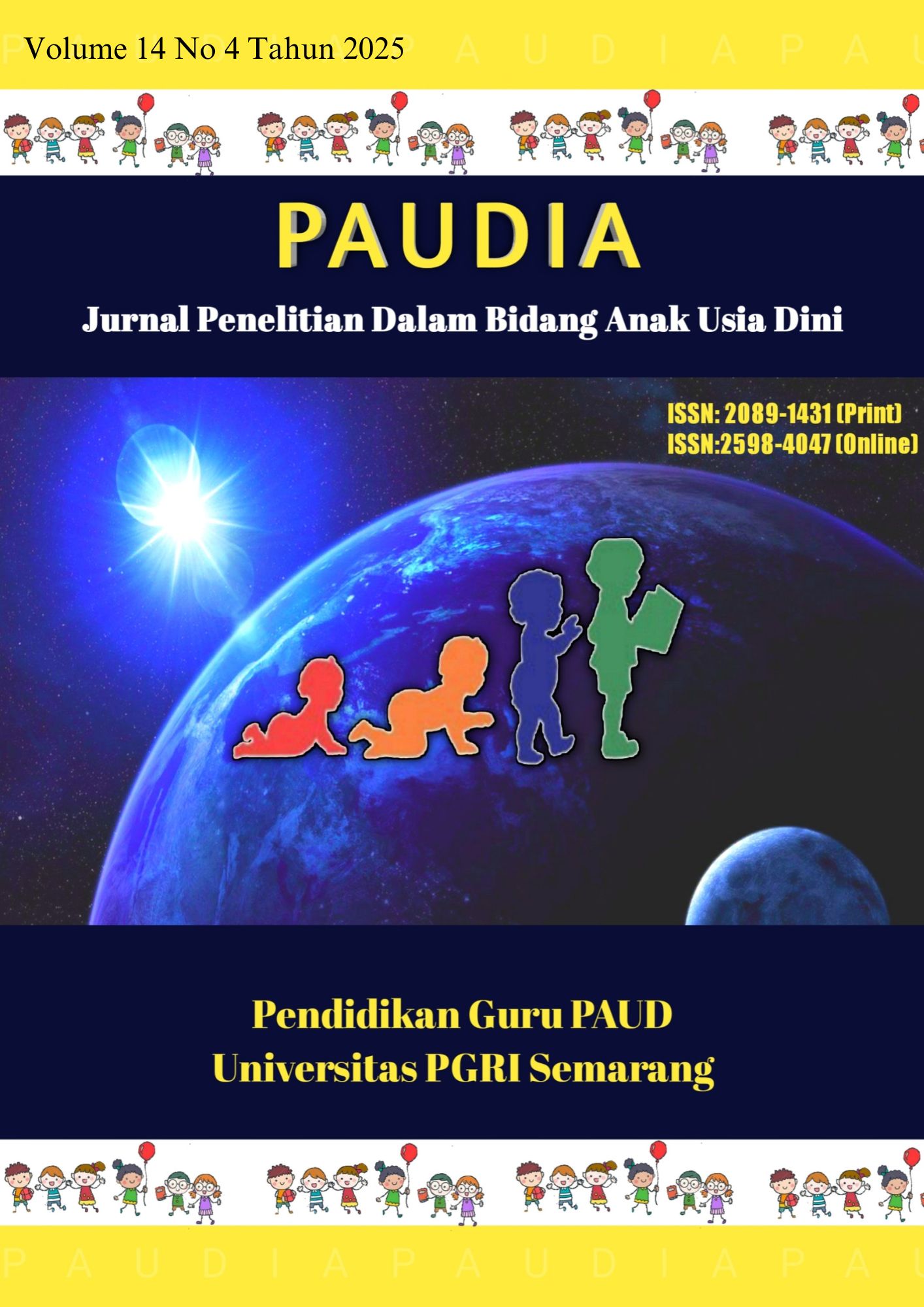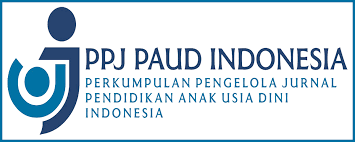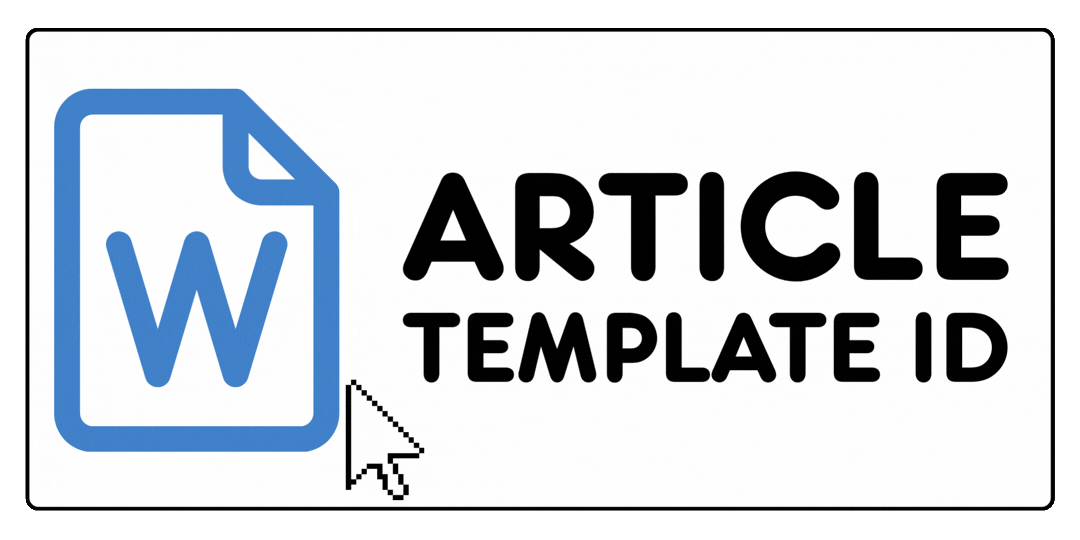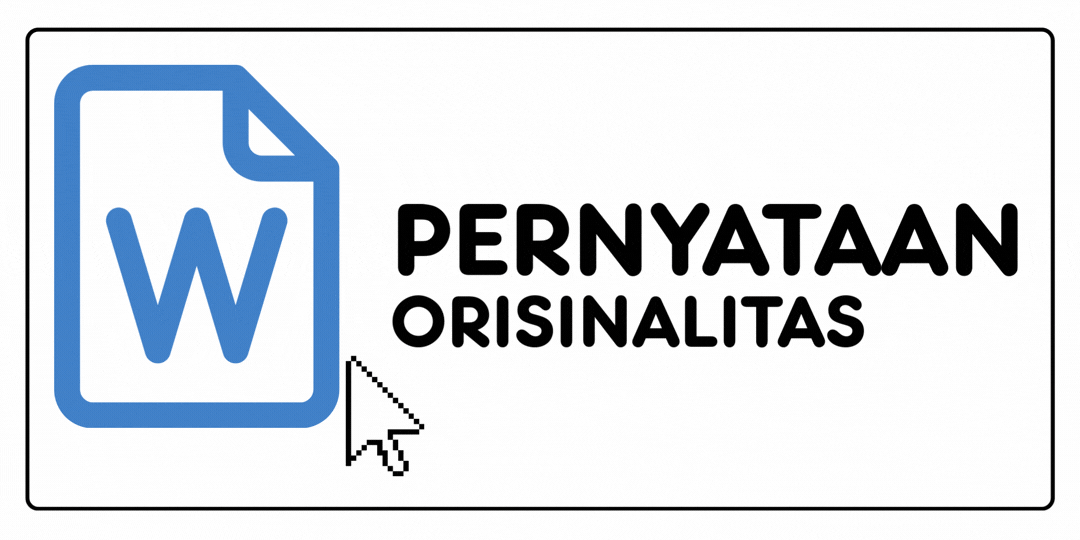Pengaruh Media Pembelajaran Digital dalam Meningkatkan Keterampilan Literasi Anak Usia 5-6 Tahun
DOI:
https://doi.org/10.26877/paudia.v14i4.2271Kata Kunci:
Media Pembelajaran Digital, Keterampilan Literasi, Anak-anak berusia 5-6 tahunAbstrak
Perkembangan literasi pada anak usia 5–6 tahun sangat penting untuk mendorong pertumbuhan kognitif, kesiapan sekolah, dan kompetensi sosial. Namun, penerapan strategi pengajaran literasi yang efektif tetap menjadi tantangan di berbagai lingkungan pendidikan. Studi ini menggunakan tinjauan literatur sistematis (SLR) untuk menganalisis dampak media pembelajaran digital terhadap literasi anak usia dini, dengan fokus pada kompetensi yang dikembangkan dan faktor-faktor yang memengaruhi efektivitasnya. Analisis 34 studi terpilih menunjukkan bahwa media digital secara signifikan meningkatkan keterampilan literasi, terutama dalam domain bahasa, komunikasi, dan kognitif. Alat interaktif seperti buku cerita digital, aplikasi pendidikan, dan permainan belajar mendorong keterlibatan, perluasan kosakata, pemahaman naratif, dan pemikiran kritis. Keterlibatan aktif orang tua dan pendidik sangat penting dalam membimbing anak-anak dan memilih konten digital yang sesuai dengan perkembangan mereka. Meskipun efek langsung pada penguasaan membaca dan menulis masih kurang dieksplorasi, temuan menunjukkan bahwa integrasi media digital dalam pengajaran literasi dapat membuat pembelajaran lebih menyenangkan dan efektif. Studi ini menyimpulkan bahwa media digital dapat menjadi alat pedagogis yang menjanjikan untuk memperkuat literasi awal, asalkan didukung oleh partisipasi aktif orang dewasa, desain konten yang cermat, dan lingkungan belajar yang kondusif.
Referensi
Aeni, S. Q., & Setiasih, O. (2024). Memfasilitasi Keterampilan Berpikir Kritis pada Anak Usia Dini: Strategi Komunikasi Guru. PAUDIA : Jurnal Penelitian Dalam Bidang Pendidikan Anak Usia Dini, 13(1), 28–39. https://doi.org/10.26877/paudia.v13i1.18072
Asmayawati, Yufiarti, & Yetti, E. (2024). Pedagogical innovation and curricular adaptation in enhancing digital literacy: A local wisdom approach for sustainable development in Indonesia context. Journal of Open Innovation: Technology, Market, and Complexity, 10(1), 100233. https://doi.org/10.1016/j.joitmc.2024.100233
Chang, I. (2023). Early numeracy and literacy skills and their influences on fourth-grade mathematics achievement: a moderated mediation model. Large-Scale Assessments in Education, 11(1). https://doi.org/10.1186/s40536-023-00168-6
Davy Tsz Kit Ng, Jac Ka Lok Leung, Samuel Kai Wah Chu, M. S. Q. (2021). Conceptualizing AI literacy: An exploratory review. Computers and Education: Artificial Intelligence, 2, 100041. https://doi.org/10.1016/j.caeai.2021.100041
Eliza, D., Mulyeni, T., Budayawan, K., Hartati, S., & Khairiah, F. (2024). Creation of Cultural Local Wisdom-Based Picture-Science Stories Application for the Introduction of Scientific Literacy for Early Childhood. International Journal on Informatics Visualization, 8(1), 417–424. https://doi.org/10.62527/joiv.8.1.2234
Fan, Y., Chong, D. K., & Li, Y. (2024). Beyond play: a comparative study of multi-sensory and traditional toys in child education. Frontiers in Education, 9(March), 1–11. https://doi.org/10.3389/feduc.2024.1182660
File, N., Mueller, J. J., Wisneski, D. B., & Stremmel, A. J. (2023). Understanding Research in Early Childhood Education. Routledge. https://doi.org/10.4324/9781315882734
Forsling, K. (2023). Collegial Learning and Digital Literacy Education in a Swedish Preschool. Early Childhood Education Journal, 51(1), 139–148. https://doi.org/10.1007/s10643-021-01289-9
Gupta, V., Rakesh, P. L., Kataria, H., Jain, M., & Pujari, S. (2025). The Impact of Excessive Technology use in Children on Long-term Attention and Focus. Journal on Innovations in Teaching and Learning, 4(1 march 2025), 86–94. https://doi.org/10.46632/jitl/4/1/10
Herwegen, J. Van. (2024). The Impact of digital Technology on Cognitive Processes and Learning Outcomes in early childhood : Evidence from Neuroscience.
Ika Sari, G., Winasis, S., Pratiwi, I., Wildan Nuryanto, U., & Basrowi. (2024). Strengthening digital literacy in Indonesia: Collaboration, innovation, and sustainability education. Social Sciences and Humanities Open, 10(May), 101100. https://doi.org/10.1016/j.ssaho.2024.101100
Isnain, W. N., Lutfhy, P. A., & Munawar, M. (2024). Pengembangan Video Pembelajaran untuk Mengenalkan Kosakata Etika untuk Anak Usia Dini. PAUDIA : Jurnal Penelitian Dalam Bidang Pendidikan Anak Usia Dini, 13(1), 49–62. https://doi.org/10.26877/paudia.v13i1.18164
Istyadji, M., & Sauqina. (2023). Conception of scientific literacy in the development of scientific literacy assessment tools: a systematic theoretical review. Journal of Turkish Science Education, 20(2), 281–308. https://doi.org/10.36681/tused.2023.016
Janet Fellowes, G. O. (2024). Language, Literacy and Early Childhood Education Series. OUPANZ.
Kelli Erwin, S. M. (2022). Digital Literacy Skills Instruction and Increased Skills Proficiency To cite this article : Digital Literacy Skills Instruction and Increased Skills Proficiency. International Journal of Technology in Education and Science, 6(2), 323–332. https://doi.org/10.46328/ijtes.364
Khalisha, F. N., & Gustiana, A. D. (2024). Pengaruh Layanan Bermain Bersama Terhadap Perkembangan Sosial Emosional Anak Di Rumah Anak SIGAP Kecamatan Koroncong. PAUDIA : Jurnal Penelitian Dalam Bidang Pendidikan Anak Usia Dini, 13(1), 127–139. https://doi.org/10.26877/paudia.v13i1.17220
Kusuma Dewi, L. P. D., Purnamika Utami, I. G. A. L., & Hery Santosa, M. (2024). The Importance of Digital Literacy Skills in the Context of Learning English for Specific Purposes: A Systematic Review. Jurnal Indonesia Sosial Teknologi, 5(8), 3006–3015. https://doi.org/10.59141/jist.v5i8.1291
Linde-Valenzuela, T., Guillen-Gamez, F. D., & Devitt, A. (2022). Digital Literacy of Teachers, Families, and Students for Virtual Participation in School: A Multiple Comparison Analysis. Revista Iberoamericana de Tecnologias Del Aprendizaje, 17(1), 1–8. https://doi.org/10.1109/RITA.2022.3149800
Macdonald, G. (2003). Using systematic reviews to improve social care improve social care. Policy, 4.
Marini, A. (2023). The effect of digital comics on improving reading literacy in Indonesian language learning. In AIP Conference Proceedings (Vol. 2727). https://doi.org/10.1063/5.0141392
Marini, A., Syafiqah, A. R., Sekaringtyas, T., Zulela, Safitri, D., Lestari, I., Suntari, Y., Siregar, R., & Yuliati, S. R. (2023). The effect of digital comics on improving reading literacy in Indonesian language learning. In AIP Conference Proceedings (Vol. 2727). https://doi.org/10.1063/5.0141392
Martin, C. D. (2021). Everyday literacy practices: Normalising the school literate child. South African Journal of Childhood Education, 11(1), 1–11. https://doi.org/10.4102/sajce.v11i1.946
Maureen, I. Y. (2021). Story time in early childhood education: designing storytelling activities to enhance (digital) literacy development.
McFadden, P., Taylor, B. J., Campbell, A., & McQuilkin, J. (2012). Systematically Identifying Relevant Research: Case Study on Child Protection Social Workers’ Resilience. Research on Social Work Practice, 22(6), 626–636. https://doi.org/10.1177/1049731512453209
Ninsiana, W., Septiyana, L., & Suprihatin, Y. (2024). Introducing eco-literacy to early childhood students through digital learning. Journal of Education and Learning, 18(1), 89–96. https://doi.org/10.11591/edulearn.v18i1.20678
Noviani, D., & Arjaya, R. (2024). Model Pembelajaran Berbasis Permainan pada Perkembangan Kognitif Anak Usia Dini. JIPI: Jurnal Ilmu Pendidikan Islam, 22(4). https://doi.org/10.36835/jipi.v22i4.4376
Nurwita, F. (2023). Developing learning media based on Android application for improving math problem solving skill of junior high school students on Pythagorean Theorem. In AIP Conference Proceedings (Vol. 2734, Issue 1). https://doi.org/10.1063/5.0163595
O’connor, G., Fragkiadaki, G., Fleer, M., & Rai, P. (2021). Early childhood science education from 0 to 6: A literature review. Education Sciences, 11(4). https://doi.org/10.3390/educsci11040178
Orji, I. J. (2022). Assessing the pre-conditions for the pedagogical use of digital tools in the Nigerian higher education sector. International Journal of Management Education, 20(2). https://doi.org/10.1016/j.ijme.2022.100626
Permatasari, A. D., & Iftitah, K. N. (2023). The Urgency and Efforts to Improve Financial Literacy in Early Childhood Education : A Literature Review. International Conference on Education Innovation and Social Science, July, 179–184.
Rahiem, M. D. H. (2021). Storytelling in early childhood education: Time to go digital. International Journal of Child Care and Education Policy, 15(1). https://doi.org/10.1186/s40723-021-00081-x
Roy, G., Sikder, S., & Danaia, L. (2025). Adopting scientific literacy in early years from empirical studies on formal education: a systematic review of the literature. International Journal of STEM Education, 12(1), 1–24. https://doi.org/10.1186/s40594-025-00547-1
Rozaimie, A., Unin, N., Johari, A., & Jawi, A. I. M. (2025). The Reading Seed Program (RSP)’s Efficacy in Fostering Toddlers’ Reading Habits in their Early Childhood Literacy. Journal of Interdisciplinary Studies in Education, 14(1), 112–131. https://doi.org/10.32674/kb8vxr06
Sakina, Hapidin, & Nurani, Y. (2025). Early Childhood Science Literacy Through Project Learning Using Loose Parts. PAUDIA : Jurnal Penelitian Dalam Bidang Pendidikan Anak Usia Dini, 14(1), 159–173. https://doi.org/10.26877/paudia.v14i1.1156
Saleha, L., Baharun, H., & Trimelia Utami, W. (2022). Implementation of Digital Literacy to Develop Social Emotional in Early Childhood. Indonesian Journal of Early Childhood Educational Research (IJECER), 1(1), 1. https://doi.org/10.31958/ijecer.v1i1.5834
Setty, K. P. N. (2024). Parental Involvement and its impact on Early Childhood Literacy Development : A Case Study Approach. Aayushi International Interdisciplinary Research Journal, 12(9), 19–31. www.aiirjournal.com
Shvartsman, M., & Shaul, S. (2024). Working Memory Profiles and Their Impact on Early Literacy and Numeracy Skills in Kindergarten Children. Child & Youth Care Forum, 53(5), 1141–1171. https://doi.org/10.1007/s10566-023-09788-z
Siswanto, J. (2022). Digital Learning Integrated with Local Wisdom to Improve Students’ Physics Problem-Solving Skills and Digital Literacy. In Journal of Physics: Conference Series (Vol. 2392, Issue 1). https://doi.org/10.1088/1742-6596/2392/1/012025
Slattery, E. J. (2025). Assessing the benefits of digital game-based learning with Minecraft in children, adolescents and young adults: A broad systematic review. In Review of Education (Vol. 13, Issue 1). https://doi.org/10.1002/rev3.70035
Solichah, N., Fardana, N. A., & Samian, S. (2025). Determinants of parental involvement in early literacy development: a scoping review. International Journal of Public Health Science (IJPHS), 14(1), 416. https://doi.org/10.11591/ijphs.v14i1.24640
Stolpe, K., & Hallström, J. (2024). Artificial intelligence literacy for technology education. Computers and Education Open, 6(October 2023), 100159. https://doi.org/10.1016/j.caeo.2024.100159
Su, J., Ng, D. T. K., & Chu, S. K. W. (2023). Artificial Intelligence (AI) Literacy in Early Childhood Education: The Challenges and Opportunities. Computers and Education: Artificial Intelligence, 4(October 2022), 100124. https://doi.org/10.1016/j.caeai.2023.100124
Su, J., & Yang, W. (2023). A systematic review of integrating computational thinking in early childhood education. Computers and Education Open, 4(August 2022), 100122. https://doi.org/10.1016/j.caeo.2023.100122
Taylor, G., Kolak, J., Norgate, S. H., & Monaghan, P. (2022). Assessing the educational potential and language content of touchscreen apps for preschool children. Computers and Education Open, 3, 100102. https://doi.org/10.1016/j.caeo.2022.100102
UNESCO. (2017). Literacy Rates Continue to Rise from One Generation to the Next. Unesco, 2016(45), 5. http://www.unido.org/fileadmin/media/documents/pdf/EEU_Training_Package/Module4.pdf
Wahidah, Formen, A., & Pranoto, Y. K. S. (2025). Early Childhood Literacy Stimulation by Parents (Systematic Literature Review). PAUDIA : Jurnal Penelitian Dalam Bidang Pendidikan Anak Usia Dini, 14(2), 376–392. https://doi.org/10.26877/paudia.v14i2.1380
Weldemariam, Kassahun, Margareth Sandvik, M. Y. (2023). Early Childhood Language Education and Literacy Practices in Ethiopia: Perspectives from Indigenous. Routledge.
Yilmaz, M. M., & Siğirtmaç, A. (2023). A material for education process and the Teacher: the use of digital storytelling in preschool science education. Research in Science and Technological Education, 41(1), 61–88. https://doi.org/10.1080/02635143.2020.1841148
Yulia, R., & Eliza, D. (2021). Pengembangan literasi bahasa anak usia dini. … Age: Jurnal Pendidikan Anak Usia Dini. https://ejournal.unisba.ac.id/index.php/golden_age/article/view/8437
Yuliana, I. (2020). Computational thinking digital media to improve digital literacy. In IOP Conference Series: Materials Science and Engineering (Vol. 821, Issue 1). https://doi.org/10.1088/1757-899X/821/1/012032
Zulfiani, Z. (2023). Digital pedagogy in Android learning media for science. In AIP Conference Proceedings (Vol. 2595). https://doi.org/10.1063/5.0123719
Zulfiani, Z., Suwarna, I. P., Juanengsih, N., Miranto, S., & Ramli, M. P. (2023). Digital pedagogy in Android learning media for science. In AIP Conference Proceedings (Vol. 2595). https://doi.org/10.1063/5.0123719
Unduhan
Diterbitkan
Terbitan
Bagian
Lisensi
Hak Cipta (c) 2025 Dewi Kurnia Nazara, Noviana Mustapa, Deri Hendriawan, Aini Mahabbati

Artikel ini berlisensiCreative Commons Attribution-NonCommercial-ShareAlike 4.0 International License.







